- Home
- Robin Hobb
The Wilful Princess and the Piebald Prince Page 9
The Wilful Princess and the Piebald Prince Read online
Page 9
Yet read what I record here. Their battle was over a fickle woman and a murdered child, over a throne and a man’s pride. No one could have planned such a cascade of events to have been brought to fruit on Midsummer’s Day. I serve a true minstrel and what I write here is as Redbird told me, mouth to ear, and he had no reason to lie even if he had been a man given to untruth.
By the next rising of the sun, Buckkeep was as divided as a single castle could be. The Canny court and their various guards dared to go armed within the walls of the king’s stronghold, and the king’s men likewise. When King Charger announced to all that there would be no charges heard against Lord Elkwin, for there was as little evidence to point to him as there was to point to the man who had slain the piebald horses, he did so not from his audience chamber but from the top of the stairs that led down from his bedchamber, his guard arrayed below him. Perhaps he thought that this declaration would offer peace to both sides, that no one would be held accountable for the killing of the horses, nor for the slaying of a child done in the madness of wild grief. If so he thought, he could not have been more wrong, for each side believed itself the more deeply wronged. It might have been wiser if he had tried to offer each side satisfaction. If he had sent two nobles to their deaths, well, bloody that would have been, yet less bloody than what followed.
No sooner had King Charger finished speaking than the very woman who had sought asylum from him the day before declared herself appalled at “this denial of all justice for anyone!”. While his words had been measured and his voice grave, she shrieked out her words, her eyes wild. She spoke in fury, saying that whether Witted or not, no woman thinks a beast, even her own Wit-beast, as precious as the child of her womb, and that “no number of slain horses could be put in the scales and balanced against a child murdered in the muck and straw of a stable”.
Lady Wiffen spoke her angry words in the moment after the king had said his, before anyone could draw a breath. Redbird marked that the king stared at her in horror, his mouth ajar.
In the next instant, she pushed past him and stalked down the staircase, shoving aside any guards who would not make way for her, and so came to the main floor and her husband’s side again. There she took her place and turned to stare up at King Charger. Lord Canny of Buck let her stand there, though he did not deign to give her a glance. A silence like death followed her words.
Then King Charger’s shoulders fell, as if something had gone out of him, the very heart dragged from his body, perhaps. Perhaps he regretted those words that showed so plainly that the Witted heart feels in a way that the wholly human cannot. He did not speak again; he made no effort to defend what he had said. He turned from all, went up the steps back to his bedchamber and he closed and barred the door. His guards heard the bar thud down and accordingly they maintained their vigilance outside his door.
How was it, then, that Charger was seen to walk alone in the Women’s Garden beneath the noonday sun? Some say that he turned into his Wit-beast, a rat or a weasel, and then slipped down to the garden where he resumed his own form. That is not true, of a certainty, for Redbird assured me that neither of those creatures was the Wit-beast of the king. He said also that of his own knowledge no Witted one can transform into a beast of any sort, no matter what the legends may say. As to how the king got out into the garden, Redbird said only that Buckkeep is an old castle, with secrets and ways of its own, and that a boy brought up within those walls might know more than one way out of an apparently locked room. As to why he might do so foolish a thing as go walking alone after aggravating such a man as Lord Canny of Buck, well, a man denied the woman he has set his heart on will do many a strange thing. The truth of that no minstrel needs attest to, for every man and woman knows it is so.
However it was, King Charger was walking alone when Redbird encountered him there. As to why Redbird was there, it was not an arranged meeting: when his king had retreated to the gloom of his chambers, Redbird had gone into the fragrant gardens to try to lift his own spirits. Like all minstrels of that time he enjoyed the protection of his guild and despite any unrest came and went as he pleased. His fingers were trained only to pluck strings, his voice to sing. Neither swordsman nor archer, no one had a reason to fear him.
And there he saw King Charger, head down, hands clasped behind his back, treading the winding paths through the thyme beds toward the old cherry trees. It seemed to Redbird that the king was so sunk in sorrow and so torn of heart that his mind almost was turned. The minstrel told me that he judged Charger to be in great danger, out in the open, unarmed, and with so many of his nobles furious with him, and yet he dared not rush off to summon the king’s guard, for that would have meant leaving him alone. Redbird feared, too, that a sudden summoning of the guard to the gardens might trigger the very sort of conflict that he hoped could be avoided. So he greeted Charger quietly, asked him no questions and strolled with him in silence. The minstrel knew that no song could soothe the king’s sore heart, nor bring wisdom to his confused mind. Silence and time might have helped King Charger to see more clearly. Silence and time might have shown him a way to satisfy all with justice. Silence and time might have done many things, but he was denied both of those things.
For as he walked with Redbird at his side, men began to approach the garden. Suddenly Charger lifted his head and gave it a shake, as if waking from a long dream. He seemed to come a little to his senses. “Assassins come,” he said to his minstrel. “This is no place for a songster. Flee, little brother. And sing ever true.” And Redbird, coward that he was, climbed one of the spreading cherry trees that grew at the edge of the garden and took refuge in its branches. Some will read this and think ill of him, and so he thought of himself, but he earnestly bade me speak exactly the truth of what he did, shameful as he thought it, so that all might know that even in this he spoke true and thus never doubt the truth of the rest of his tale. He had no weapon or knowledge of how to use one. All he had was a voice and a tongue, eyes that watched and a mind that remembered. In the end, those were all he could offer to defend his king.
And in a moment, he saw the truth of the king’s words. How they had known to find him there, Redbird Truthsinger did not know, and no more do I. The killers came in ones and twos, and all bore blades, not sheathed, but carried naked and shining in the Solstice sun. Their faces, too, were naked of artifice and shining with hate, and their intent was as bare as their blades. As they closed upon him, Charger set his feet and waited grimly for them. King Charger stood there alone, his back to the tree, as the circle of men gathered around him. Now these are the names of those who came to that place. Lord Canny of Buck was there, and Lord Fenrew of Tilth, and Lord Tracker of Farrow. Young Lord Locks of Bearns, scarce old enough to raise a whisker, and Lord Scriver of Buck, third cousin to both the king and Lord Canny, and also Lord Holdfast of Rippon. Not one was a rightful duke, and some were second sons and one at least had no prospect of inheriting at all, and yet each was a scion of a ruling family of a duchy. These are the six the minstrels have named, and the truth is that, yes, they were there. But there was another as well.
“You know why we have come,” Lord Canny told the king, and the king, unarmed and surrounded, laughed aloud with despair.
Now many another minstrel will recount a long speech that was made then, or say how Charger hissed like a snake or snarled like a wolf. Often and often was it told, even in those days, how the king drew his blade and slew young Lord Lock, and how then Lord Canny fought single-handed against him, and that the king changed his shape, from wolf to bear to giant serpent, to flame-tongued dragon to giant poisonous toad. Oh, aye, many a valiant song has been sung of that encounter. But the truth was that the king was empty-handed as he stepped away from the tree, and his enemies moved to ring him. Yet he ignored them all except his cousin but walked toward him saying, “You have the heart of the woman I love, and the hands of my nobles. You have my throne in all but name, and that is why you have come. To take from me my cro
wn.” Those are the words Charger said, just as Redbird Truthsinger recited them to me. He drew breath to say something else but what that might have been, none can say.
For Lord Curl of Blackearth was also there, and he stepped forward and without a sound or word of challenge he wrapped his arm about the king’s throat from behind, choking him, then drove his short sword into King Charger’s back and twisted the blade in the wound.
Young Lord Lock it was who cried out in horror at such dastardliness and leaped forward to tear the coward from his victim. Lord Curl, in the redness of his battle fury, snatched his sword from the king’s back and with a swing cut the boy’s throat from side to side so that he fell choking on his own blood. Then all, even the miscreant himself, stood back in horror from what he had done.
Lord Canny cried out to them all, “Blades down! Be still and think! What are we to say happened here?”
Above him in the tree, Redbird muffled his mouth with his sleeve. Terror raced his heart and grief closed his throat and cowardice left him powerless to move, but a raven in the branch above him croaked hoarsely. The king had fallen upon his face in the dirt, yet he was only sorely wounded and not to the death. King Charger stirred then, and rolled onto his side and spoke, almost with triumph, “Traitors one, traitors all, and all will swing for it.” His eyes locked with Lord Canny’s as he spoke his foolish words. All knew what his words did not say: that both crown and woman would be his when Canny had hanged for treason.
Those were the words that sealed his fate, for then it was that they all closed on him. There was no grand challenge and duel, no king assuming the shapes of beasts as he battled Lord Canny. They did not defeat him, and then hang him for his magic. No. There was only a frenzy of swords plunging into an unarmed man on his belly on the earth, and before it was over, not a blade remained clean and honourable.
Only one man saw what had happened. Only one man owned the truth of that moment, and he was a minstrel clinging to the trunk of a cherry tree above them, sick with the slaughter and betrayal, unmanned by his faintheartedness.
Do false minstrels sing of how Lord Canny and his cohorts cut King Charger’s body into four pieces and burned it over water to keep his soul from finding his flesh again? They lie. The reason they hewed it to pieces, swords rising and falling like butchers’ cleavers, was that they wished no man to see the many cruel cuts that had pierced him, and not a few in his back. The blood from their flying blades spattered up even to the lowest branches of the cherry tree, and over them all flew a raven, cawing and cawing in his distress.
Nor did they burn his flesh. At least, not while Redbird dizzily watched did they do so. Instead, Lord Canny demanded that each man take a piece of the hewn body, wrapped in his cloak, and bear it away until he could decide how they would speak of all that had happened. And when King Charger’s body had been gathered, it was Canny himself who took away in his cloak the head and the circlet that still adorned it. Young Lord Lock of Bearns they left beneath that tree. It was Lord Curl who drew the king’s hip-knife from its sheath and left it standing in the boy’s back, as if such a short blade could have cut his throat so deeply that it near severed his neck as Curl’s blade had done.
Now the tale returns to Redbird who bade me note clearly that he considered himself an unredeemable coward but a truthful one. Sick of soul and quaking with terror, he felt he could neither loosen his grip on the trees branches nor otherwise move. He stayed in the tree for all that day and through the night to the next day. Only the raven did he have for company, and the bird came and sat on the branch near him and watched him with one eye, as if to say that they alone could witness the truth of what had been done. Yet Redbird the minstrel felt he had been seized by silence. A kitchen maid came in the early morning with a gathering basket on her arm, and when she saw the body of young Lord Lock, she fled screaming. Still Redbird did not stir.
Even when men came to examine the body and shout over the king’s knife in his back, and then to bear away the body of young Lord Lock, Redbird did not call out to them or come down. Even when he heard them exclaim at how low a death the boy had suffered, stabbed in the back by the king with his buck’s-head knife and left in the dirt like dead vermin, Redbird was still. All that time, folk came and went under the tree, talking and gossiping of what they knew not, weaving a tale from blood on the earth and a small dirk in a boy’s back. And never once did any of them look up to see the stricken minstrel and the raven in the tree.
Perhaps he would have stayed in the tree until he died, save that in his weariness and hunger and yes, terror, he finally swooned and fell from the branches to the blood-soaked earth below. There he was found by a cook’s helper, come late to the garden to gather herbs, and she called the healers. They gathered him up and took him into the castle. None could tell what ailed him, for the blackness of what he had seen had stilled his tongue and turned his eyes to staring. They all knew him for the king’s minstrel and thought he had come to that spot to see where the evil deed had been done. Few thought well of him, tainted as he was now by Charger’s friendship. But they bathed him, and fed him, and cared for him tenderly as is the rightful duty of a healer to any injured man. And so I will speak no ill of them.
After a day had passed, word was sent to his mother, to me, to come to take charge of my son, a man turned to a child again. And when I arrived there, I found Redbird as they had told me, staring of eye and still of tongue. And outside the window by his bed a raven sat in a tree and watched us. So the healer Nance remarked to me, saying the raven had followed them as they carried him from the garden to this bed, and as she is known as a woman who speaks true, so shall it be recorded as truth here.
I took my son back to my rooms in the keep. Alone, I urged him to walk and I took him up the stairs, a step at a time. No one aided me, but no one hindered me either. A draught I mixed for him, one long known to my family, and he plunged into sleep. A night and a full day and half a night more passed before he opened his eyes, but when he did, his soul was in his body again. And in the dark of that night, as I sat by his bed in a room lit by a single candle, his first words to me were that I must fetch the best pen and ink and vellum to write on. And when I had done so he first told me the full tale of all that had happened. Sitting in that circle of yellow light, I wrote it down as he spoke it, each word fresh and new in the telling, to be sure no drop of truth was lost from it.
Since no one had seen Redbird in the garden, none of the traitors who had slain their king knew there was a witness to their deed. Redbird lay in my room, as ill as if his body had been beaten from the shock to his heart and mind. The news I brought back to him each day grieved us both, for Buckkeep, and then all the Six Duchies, seemed to go mad. The king was missing, and the foul tale spread that he had killed young Lock and then fled his evil deed. With no man on the throne to keep order or speak of peace or measured justice, hatred flared and spread like a summer fire.
Much changed in the next ten days. I kept to my routine as far as I could, but said little of Redbird recovering in my room. The door to my chamber was always bolted. My meals with the other servants supplied me with all I needed of gossip and rumour, and all of it was frightening. I scarcely dared look out the window onto the courtyard below for fear of what I might see. All the piebald horses in Buckkeep and every spotted hound in the stables were put to the sword. Those who dared denounce such deeds were declared Witted, partaking of the king’s evil magic. Many a noble of the Motley Court was beaten or simply vanished. Any that could flee did. To be Witted had become a sign of an evil and beastly nature, low and deceiving.
By the end of the month, common men and women had been hanged for the offence of being Witted. That was when the custom of quartering the bodies and burning the parts over water began, for all sorts of tales had spread of how the Witted could change into beasts, or hide their souls in their Witted partner’s body and return later to reclaim their own dead flesh. Now this was a tale never heard before, and I ju
dged that I knew well why such an idea was being planted. To be Witted was spoken of as a taint, and children with one Witted parent were just as endangered as those who had formerly claimed the Wit proudly in their professions as animal-healers and shepherds and grooms. All, not just the truly Witted, lived in terror of being accused of beast-magic. Many – nobles as well as merchants and tradesmen – fled Buckkeep and the entire duchy of Buck, leaving behind their homes, their fortunes and even their names. It was a blood-letting such as Buck had never known.
The Duke of Buck, Strategy Farseer, brother to dead Virile and father to Lord Canny, tried to calm the wild seas that pounded the throne, but he was elderly and not in the best of health. He pointed out that he was the rightful heir to the crown, but he was man enough to refuse to take the throne while the king to whom he had sworn allegiance might still be alive. The other dukes and duchesses of his realm were not so high-minded. Every evil that had befallen the Six Duchies for the last score of years were laid at the feet of the Piebald Prince and the Witted ones he had raised to power. They spoke of his absence as a blessing, and for the first time in many years even the lesser courtiers gossiped openly that the Farseer line had been polluted by the blood of a Chalcedean slave who was a beast-wizard. It was time, they said, for the crown to go to one of true and pure lineage, someone who could redeem the Farseer line from the depths to which it had fallen. They called for Canny to step forward and don the crown that his father had not claimed.
They knew King Charger was dead. This perhaps my Redbird would not sing as a truth, but I saw it in their hard eyes. They never feared that the king would reappear to claim his throne. Even then, I believe, they were concocting the lie that would explain why no body had been found. Their cowardly slaughter of King Charger was being transformed by false-hearted nobles and minstrels who cared only for the favour of the powerful and nothing for the truth. But, to be true to Redbird, I shall write here that the flat truth is that I have no proof that any of them knew, save those who had been present at the murder.

 Ship of Destiny
Ship of Destiny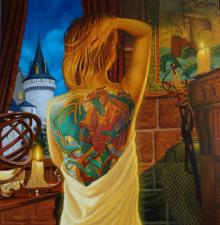 Golden Fool
Golden Fool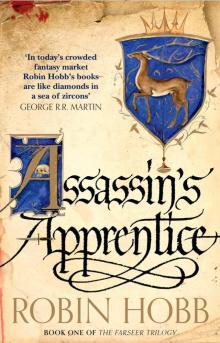 Assassins Apprentice
Assassins Apprentice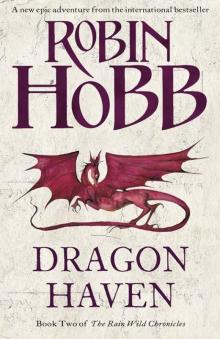 The Dragon Keeper
The Dragon Keeper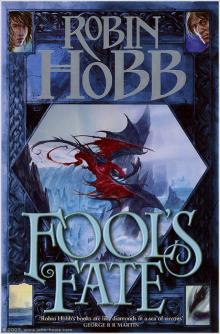 Fools Fate
Fools Fate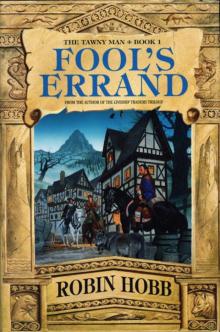 Fools Errand
Fools Errand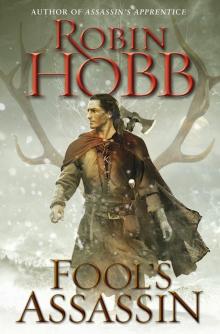 Fools Assassin
Fools Assassin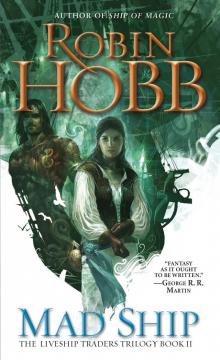 The Mad Ship
The Mad Ship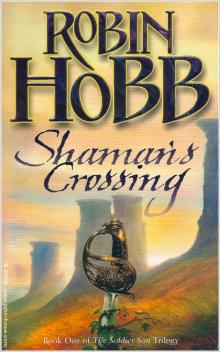 Shamans Crossing
Shamans Crossing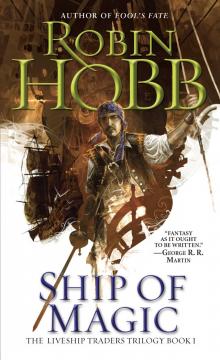 Ship of Magic
Ship of Magic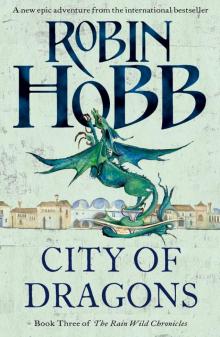 City of Dragons
City of Dragons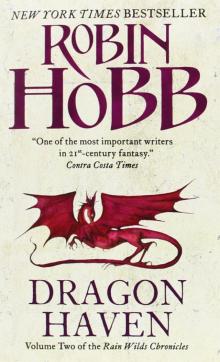 Dragon Haven
Dragon Haven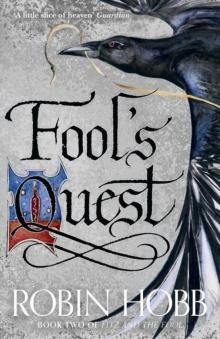 Fools Quest
Fools Quest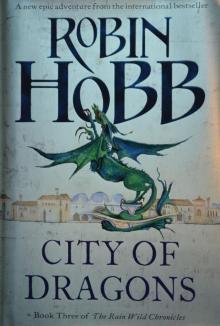 Blood of Dragons
Blood of Dragons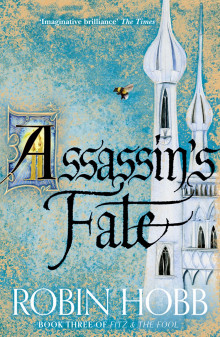 Assassin's Fate
Assassin's Fate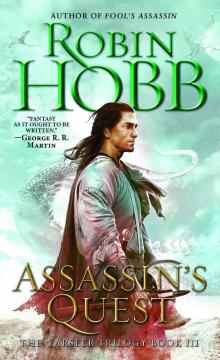 Assassins Quest
Assassins Quest Renegades Magic
Renegades Magic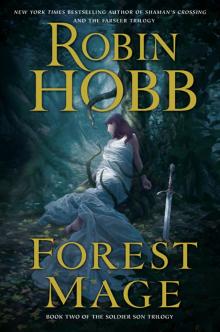 Forest Mage
Forest Mage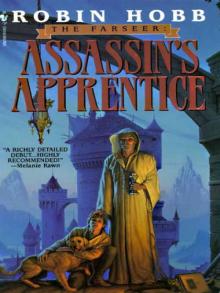 Assassin's Apprentice tft-1
Assassin's Apprentice tft-1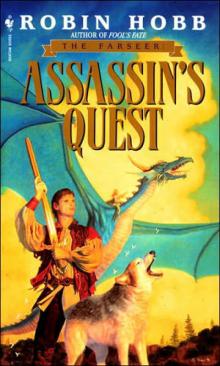 Assassin's Quest tft-3
Assassin's Quest tft-3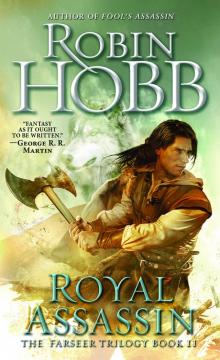 Royal Assassin
Royal Assassin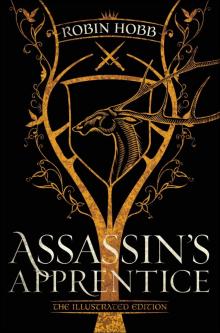 Assassin's Apprentice (The Illustrated Edition)
Assassin's Apprentice (The Illustrated Edition)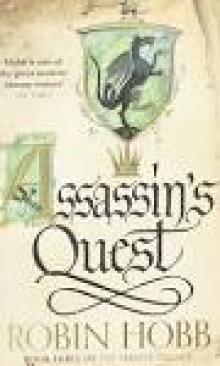 Assassin's Quest (UK)
Assassin's Quest (UK)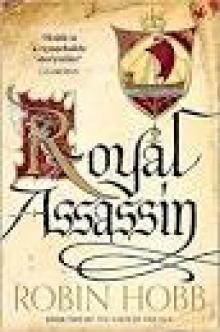 Royal Assassin (UK)
Royal Assassin (UK)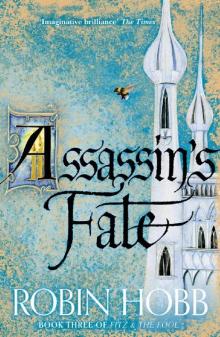 FF3 Assassin’s Fate
FF3 Assassin’s Fate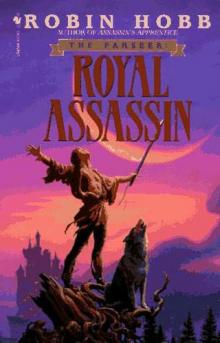 Royal Assassin tft-2
Royal Assassin tft-2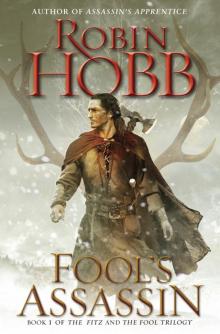 Fool’s Assassin: Book One of the Fitz and the Fool Trilogy
Fool’s Assassin: Book One of the Fitz and the Fool Trilogy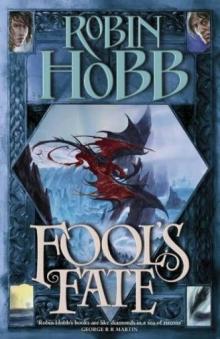 Fool's Fate ttm-3
Fool's Fate ttm-3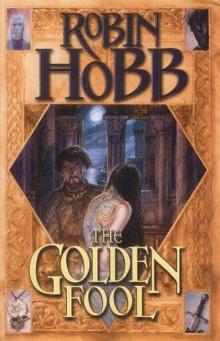 The Golden Fool ttm-2
The Golden Fool ttm-2 The Liveship Traders Series
The Liveship Traders Series The Wilful Princess and the Piebald Prince
The Wilful Princess and the Piebald Prince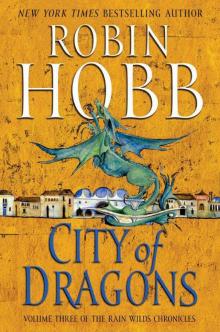 City of Dragons rwc-3
City of Dragons rwc-3 The Tawny Man 1 - Fool's Errand
The Tawny Man 1 - Fool's Errand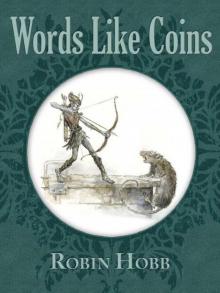 Words Like Coins
Words Like Coins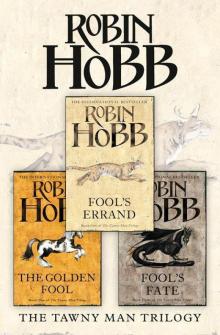 The Complete Tawny Man Trilogy Omnibus
The Complete Tawny Man Trilogy Omnibus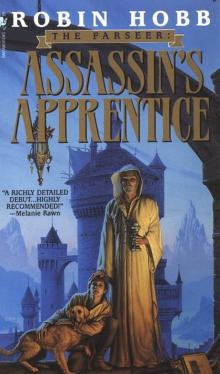 Farseer 1 - Assassin's Apprentice
Farseer 1 - Assassin's Apprentice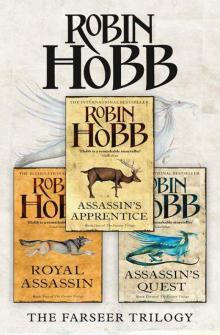 The Complete Farseer Trilogy Omnibus
The Complete Farseer Trilogy Omnibus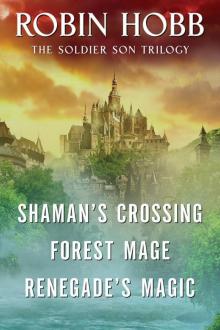 The Soldier Son Trilogy Bundle
The Soldier Son Trilogy Bundle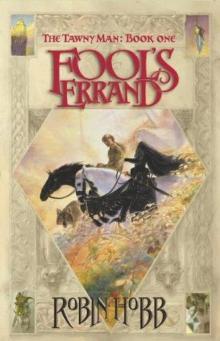 Fool's Errand ttm-1
Fool's Errand ttm-1 Blue Boots
Blue Boots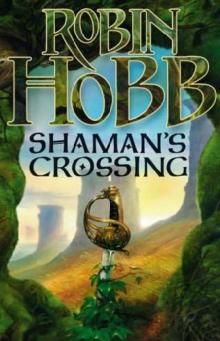 Shaman's Crossing ss-1
Shaman's Crossing ss-1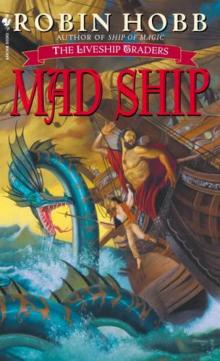 Mad Ship
Mad Ship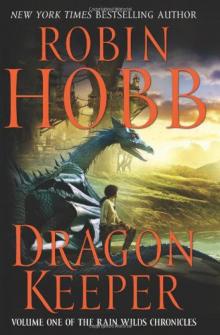 Dragon Keeper
Dragon Keeper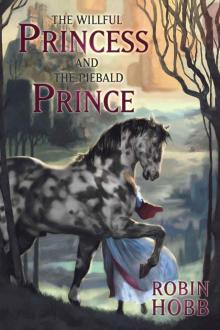 The Willful Princess and the Piebald Prince
The Willful Princess and the Piebald Prince Ship of Destiny tlt-3
Ship of Destiny tlt-3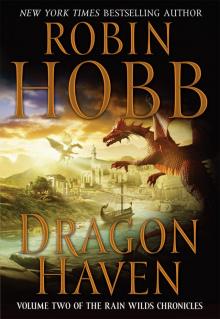 Rain Wild Chronicles 02 - Dragon Haven
Rain Wild Chronicles 02 - Dragon Haven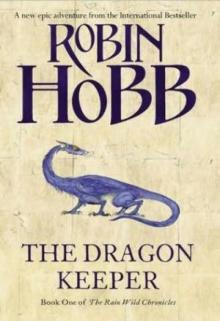 The Dragon Keeper trwc-1
The Dragon Keeper trwc-1 The Triumph
The Triumph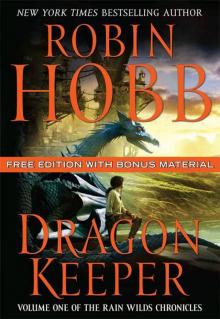 Dragon Keeper Free Edition with Bonus Material
Dragon Keeper Free Edition with Bonus Material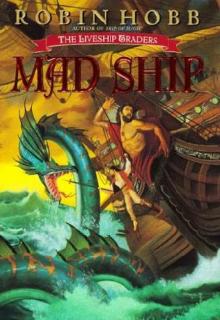 Mad Ship tlt-2
Mad Ship tlt-2 The Inheritance and Other Stories
The Inheritance and Other Stories Tawny Man 02 - Golden Fool
Tawny Man 02 - Golden Fool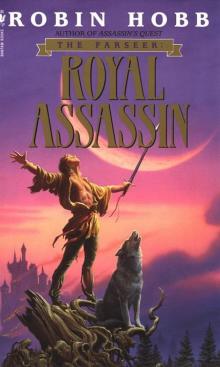 Farseer 2 - Royal Assassin
Farseer 2 - Royal Assassin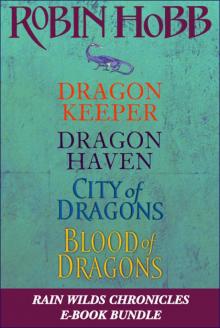 Rain Wilds Chronicles
Rain Wilds Chronicles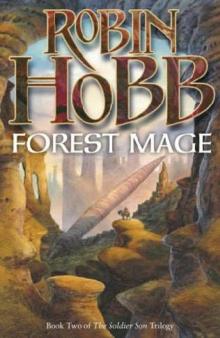 Forest Mage ss-2
Forest Mage ss-2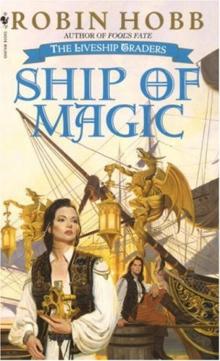 Ship of Magic lt-1
Ship of Magic lt-1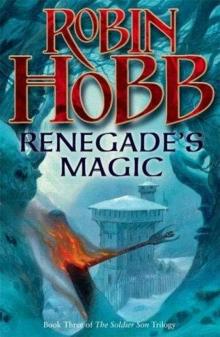 Renegade's Magic ss-3
Renegade's Magic ss-3